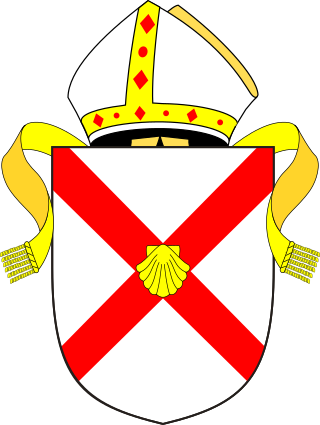Related Research Articles
John Chishull or John de Chishull was Lord Chancellor of England, Bishop of London, and Lord High Treasurer during the 13th century. He also served as Dean of St Paul's.

The Bishop of Worcester is the head of the Church of England Diocese of Worcester in the Province of Canterbury, England.

The Bishop of Rochester is the ordinary of the Church of England's Diocese of Rochester in the Province of Canterbury.

The Bishop of Winchester is the diocesan bishop of the Diocese of Winchester in the Church of England. The bishop's seat (cathedra) is at Winchester Cathedral in Hampshire. The Bishop of Winchester has always held ex officio the office of Prelate of the Most Noble Order of the Garter since its foundation in 1348, and Bishops of Winchester often held the positions of Lord Treasurer and Lord Chancellor ex officio. During the Middle Ages, it was one of the wealthiest English sees, and its bishops have included a number of politically prominent Englishmen, notably the 9th century Saint Swithun and medieval magnates including William of Wykeham and Henry of Blois.

Richard Swinefield was a medieval Bishop of Hereford, England. He graduated doctor of divinity before holding a number of ecclesiastical offices, including that of Archdeacon of London. As a bishop, he dedicated considerable efforts to securing the canonisation of Thomas de Cantilupe, his predecessor, for whom he had worked during his lifetime. Active in his diocese, he devoted little time to politics. He was buried in Hereford Cathedral where a memorial to his memory still stands.
Henry of Sandwich was a medieval Bishop of London.
Richard Gravesend was a medieval Bishop of London.
The Archdeacon of Gloucester is a senior ecclesiastical officer in the Diocese of Gloucester, England whose responsibilities include the care of clergy and church buildings within the area of the Archdeaconry of Gloucester.
The Archdeacon of Buckingham is the senior ecclesiastical officer in charge of the Church of England in Buckinghamshire.
The Archdeacon of Cornwall is a senior cleric in the Church of England Diocese of Truro.
John de Northwode was an English medieval churchman and university chancellor. He was the son of John de Northwode and Agnes, daughter of William de Grandison; and nephew of John de Grandison.
William Parker was an Anglican priest. and archdeacon of Cornwall.
Thomas Butiller was an English priest in the late 14th and early 15th centuries.
William Piers, D.D. was an English Anglican priest in the 17th century.
Robert Hall, D.D. was an Anglican priest in England during the 17th century.
John Rixman was a 16th century English priest.
Richard Ewen was an English priest in the second half of the 15th century.
Roger Rotherham was an English priest in the second half of the 15th century.
Clement Breton D.D. was an English priest in the 17th century.
Edward Cotton was the Archdeacon of Cornwall from 1660 until his death.
References
- ↑ "The Writings of John Greenwood and Henry Barrow 1591-1593" Carlson, L.H. (Ed) p258: London; Rotledge; 1970
- ↑ Alumni Oxonienses 1500-1714, Horrobin-Hyte
- ↑ Horn, Joyce M. (1974), Fasti Ecclesiae Anglicanae 1541–1857, vol. 3, p. 59
- ↑ Le Neve, John; Hardy, Sir Thomas Duffus (1854). . Fasti ecclesiae Anglicanae. Vol. 1. Oxford: Oxford University Press. pp. – via Wikisource.